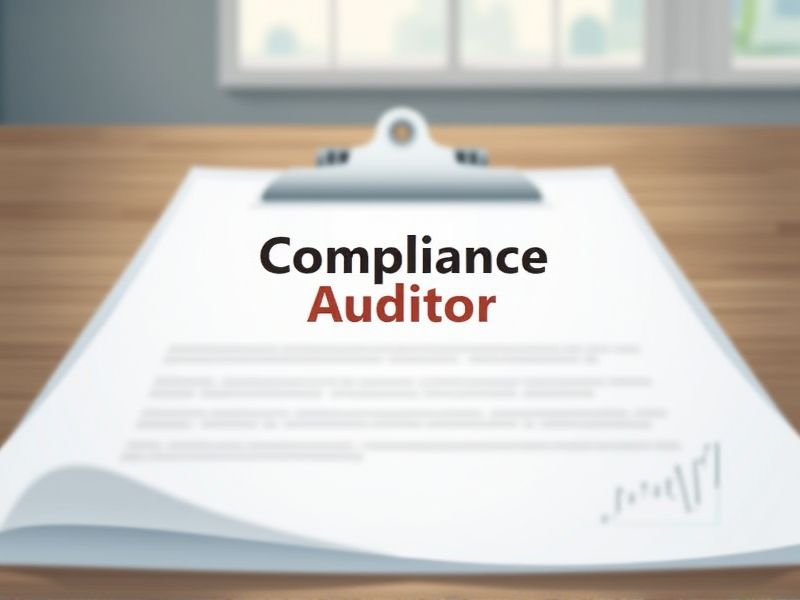
Compliance auditors must navigate dynamic regulatory environments, which necessitates specialized knowledge that certifications can provide. Certifications validate an auditor's expertise in risk management, internal controls, and governance frameworks, helping them to address potential compliance issues effectively. Employers often prioritize candidates with certifications as they signify a standardized level of competence and commitment to continuous professional development. Below are several key certifications that can enhance your qualifications as a Compliance Auditor.
Certified Internal Auditor (CIA)
The Certified Internal Auditor (CIA) designation provides auditors with specialized knowledge and skills required for comprehensive compliance assessments. When a compliance auditor holds a CIA certification, organizations can be more confident in their adherence to regulatory standards due to the thorough evaluation skills involved. The CIA credential equips professionals with advanced auditing techniques necessary for detecting and mitigating risks associated with non-compliance. With a deeper understanding of internal controls and governance, a CIA-certified auditor can enhance an organization's overall compliance framework.
Certified Information Systems Auditor (CISA)
The CISA credential is crucial for a Compliance Auditor as it validates expertise in assessing and managing IT systems and processes. Organizations increasingly rely on technology, so auditors with CISA are essential to ensure IT compliance with industry standards and regulations. CISA-certified professionals possess skills in identifying control gaps that might lead to non-compliance or security breaches. Hiring a Compliance Auditor with CISA certification enhances trust and accountability within the organization.
Certified Fraud Examiner (CFE)
Hiring a Certified Fraud Examiner (CFE) enhances a compliance auditor's ability to detect fraudulent activities due to their expertise in fraud prevention and investigation. CFEs bring specialized skills in forensic accounting, allowing auditors to identify anomalies in financial records that might indicate fraud. Their knowledge of legal aspects and regulations aids in ensuring that compliance audits adhere to industry standards and legal requirements. An organization benefits from CFEs as they provide valuable insights into potential risks and help design robust internal controls to mitigate fraud-related threats.
Certified Regulatory Compliance Manager (CRCM)
Certified Regulatory Compliance Manager (CRCM) credential ensures that compliance auditors possess the necessary expertise to navigate complex regulatory frameworks effectively. This expertise results in more accurate and thorough audits, minimizing legal and financial risks for organizations. Organizations benefit from enhanced trust and credibility with stakeholders, as the CRCM designation signifies a commitment to regulatory excellence. Over time, the presence of CRCM-certified auditors can lead to improved compliance systems and processes within the organization.
Certified Risk Management Assurance (CRMA)
Greater complexity in regulations increases the demand for specialized skills in risk management, prompting the need for Certified Risk Management Assurance (CRMA) among compliance auditors. With CRMA certification, auditors gain enhanced abilities to identify and evaluate risk management processes, thereby improving audit effectiveness. Effective risk assessment insights from CRMA strengthen the strategic decision-making process in organizations. The holistic view provided by CRMA knowledge equips compliance auditors to proactively address potential risks, thereby fortifying organizational resilience.
Certified Government Auditing Professional (CGAP)
Certified Government Auditing Professional (CGAP) credential equips compliance auditors with specialized knowledge of public-sector auditing standards. Mastery of these standards improves auditors' ability to assess and ensure regulatory compliance. Acquiring the CGAP certification enhances professional credibility and trust with stakeholders. The certification provides auditors with a framework to identify risks and implement effective control measures within government operations.
ISO 27001 Lead Auditor
Becoming an ISO 27001 Lead Auditor equips compliance auditors with the necessary qualifications to conduct formal certification audits in information security management, ensuring companies meet international standards. This credential enhances the auditor's ability to identify potential security risks and recommend corrective actions, thereby safeguarding sensitive data. The certification process requires understanding of complex processes and controls, ensuring they align with organizational policies and regulatory frameworks. With this expertise, organizations can improve their defense mechanisms against data breaches and regulatory fines.
Certified Quality Auditor (CQA)
Certified Quality Auditors (CQAs) possess specialized knowledge in quality systems, ensuring that compliance auditors can effectively evaluate and improve organizational processes. With a solid understanding of regulatory standards and best practices, they help organizations meet legal and quality requirements, reducing the risk of non-compliance. Their skills in audit management, data analysis, and problem-solving enhance the capability to identify and rectify issues promptly. Organizations employing CQAs demonstrate a commitment to maintaining high-quality standards, thereby enhancing their reputation and stakeholder trust.
Certified Healthcare Compliance (CHC)
Certified Healthcare Compliance (CHC) credentials equip compliance auditors with specialized knowledge of regulatory requirements, which enhances their ability to identify potential compliance risks within healthcare organizations. This certification fosters a deep understanding of healthcare laws and regulations, allowing auditors to conduct more thorough and effective compliance reviews. CHC certification often increases an auditor's credibility and trustworthiness in the eyes of stakeholders, which can lead to greater cooperation during audits. A CHC-certified auditor is typically more adept at developing and recommending robust compliance programs, improving overall organizational adherence to legal standards.
Project Management Professional (PMP)
Holding a Project Management Professional (PMP) certification equips a Compliance Auditor with structured project management skills crucial for organizing and executing thorough compliance reviews. PMP training enhances the auditor's ability to manage timelines, resources, and communication effectively, which are vital for comprehensive audits. The rigorous framework of PMP supports consistent adherence to standards and regulations, ensuring audit processes meet required compliance benchmarks. As projects become more complex, PMP-certified auditors are better prepared to navigate multifaceted compliance landscapes, aligning audit outcomes with organizational goals.
Summary
When you, as a Compliance Auditor, acquire certifications, your credibility within the field significantly increases. This enhanced credibility often leads to expanded career opportunities due to the specialized knowledge and skills you bring. Organizations also may view you as a more valuable asset, potentially increasing job security and compensation. The certifications can lead to improved compliance processes and risk management practices within the organization, benefiting overall operational integrity.
